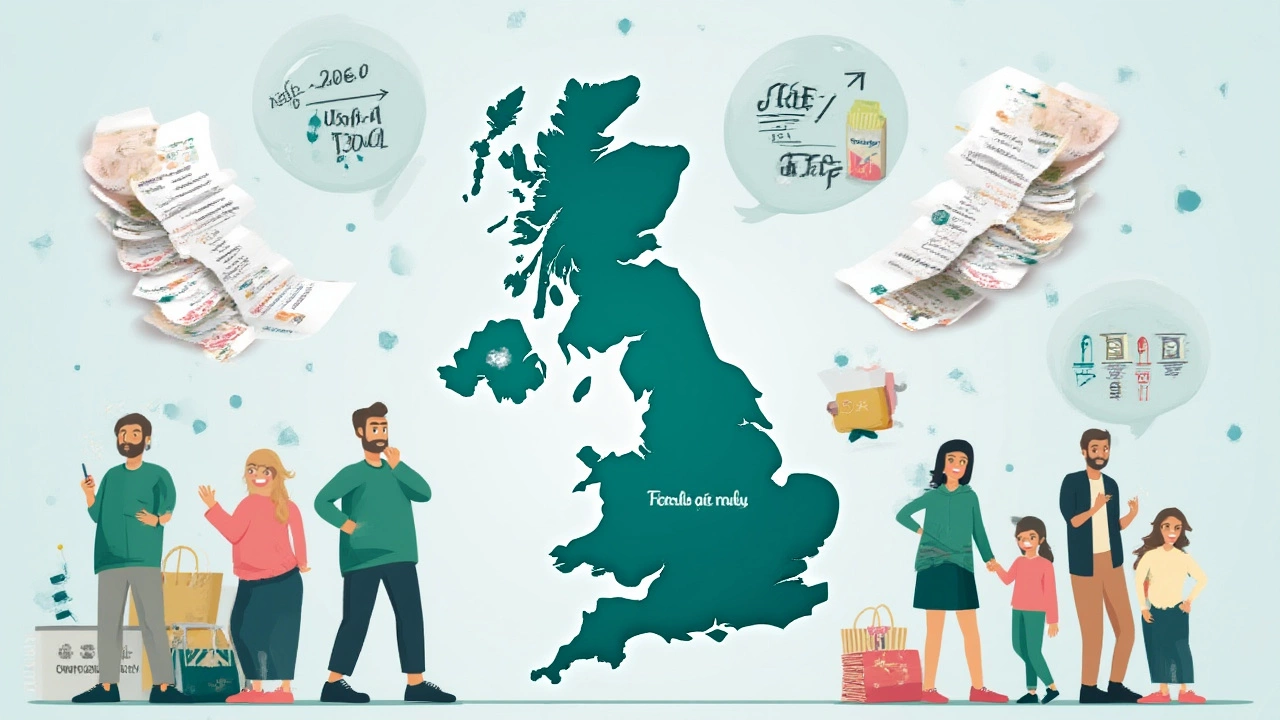Average Middle Class Christmas Spending: Costs, Trends, and Saving Tips
 Jul, 12 2025
Jul, 12 2025
Picture December’s calendar—every square packed with invites, school concerts, family dinners, and let’s not forget the frantic search for this year’s must-have presents. For most middle class families, Christmas spending feels like a marathon you didn’t sign up for, and everyone’s sprinting at once. So just how much do people hand over for that one day each year? You might be surprised at the real numbers behind the fairy lights and festive adverts.
The True Cost of Christmas: Where Does the Money Go?
It starts off so simple: one or two thoughtful gifts, a good turkey, a bottle of red. But once you pile on all the hidden extras—stocking stuffers, Secret Santa at work, train tickets to see the in-laws, new party clothes for the kids, festive nibbles, fairy lights, holiday charities, even that last-minute ‘just in case’ gift—you end up with a shopping list longer than Santa’s. According to a YouGov survey run in late 2024, the typical middle class household in the UK spent just over £1,050 on Christmas last year. Meanwhile, in the United States, Statista reported the average family shelled out $1,530 (about £1,220 when converted) once gifts, food, decorations, travel, and activities were all added up.
Breaking that down: just under 60% goes to gifts, with the rest split between food, drink, travel, and trimmings. Here’s a quick look at how it often ends up on bank statements:
| Category | UK Average (£) | US Average ($) |
|---|---|---|
| Gifts | £610 | $950 |
| Food & Drink | £260 | $340 |
| Decorations | £55 | $110 |
| Travel | £70 | $90 |
| Other (events, cards, etc) | £55 | $40 |
Already got a headache? Me too. Christmas spending looked very different fifty years ago, before mass marketing, online shopping, and Black Friday swept everyone up. The average household Christmas bill in 1975 was less than £50, factoring in inflation, because festive gifting was smaller, and ‘keep up with the Joneses’ wasn’t running wild on Instagram.
Of course, Christmas cost varies depending on where you live and your own family’s traditions. Still, it’s clear: costs have crept up, and most people spend more than they think. Shopping with wish lists, using free online budgeting tools, and starting early can make all the difference between a ‘ho-ho-ho’ January and a ‘uh-oh’ credit card bill.
Gift Giving: Big Surprises, Bigger Bills
Bags of presents under the tree are the heart of Christmas morning, and for most middle class families, gifts grab the lion’s share of the December budget. According to the National Retail Federation’s 2024 data, in the US, the average person planned to spend about $875 (£700) just on presents for close family and friends. The same survey revealed an interesting twist: while parents set out planning to cut back, most ended up buying more than they promised themselves—likely thanks to last-minute ‘deals’ filling inboxes and social ads targeting your every online move.
The pressure is real, especially for parents who want to make Christmas magical for little ones. Video game consoles (Nintendo Switch or PlayStation 5), popular LEGO sets, and branded toddler toys made up the priciest chunk in 2024, while classic books, art supplies, and family board games saw a comeback among budget-conscious buyers. The trick people often miss: time spent together and well-picked personal gifts feel just as special, if not more, to most kids. An Ipsos poll in late 2024 even showed over 70% of children remember the traditions (like baking cookies or making ornaments) more clearly than big-ticket items.
Here’s a reality check: impulse gifts add up. That ‘just one more little present’ mindset can quietly add hundreds to the final bill. Planning helps. Try setting a per-person budget, sticking to it, and shopping with a list already saved on your phone. Shopping early, from September onward, usually means you pick up deals and skip sold-out panic, too. One more tip: lots of families have found that doing Secret Santa or White Elephant gift swaps with extended relatives seriously cut their overall spend—but not on fun.

Food, Drink, and Festive Feasts: More Than Just Turkey
You’d think the biggest cost would be presents, but food and drink are catching up fast—right behind gifts in family Christmas spending. The Office for National Statistics reported in January 2025 that groceries saw a special seasonal spike, with average households spending nearly £100 more on food in December versus any other month. Once you count the party snacks, Christmas crackers, mulled wine, cheese platters, and breakfasts for visiting guests, that figure jumps quickly.
In the UK, the Christmas meal alone can easily hit £120 for a gathering of six to eight, if you add all the extras: drinks, starters, desserts, and a cheeseboard worthy of a cheese-lover’s dream. And if you’ve hosted, you know how easy it is to overbuy. An Appinio study this year found that about a third of Brits admitted to throwing away uneaten Christmas food—about £30 worth per family, on average. That adds up to a lot of wasted bakes and crumpled Quality Street wrappers.
But it’s not just about the main meal. All through December, the expenses pile up: coffee catch-ups, secret Santa lunches, snacks at Christmas fairs, and fancy bottles ‘to save for the day.’ According to Mintel’s 2025 Holiday Report, festive tipples alone cost the average adult nearly £70, with prosecco and Irish cream liqueurs most popular.
If you’re watching your spend, there are plenty of creative ways to keep the Christmas feast fabulous but frugal:
- Make a menu in advance, and stick to your shopping list.
- Bulk-buy snacks and drinks early in December when they’re often on offer.
- Consider pot-luck style—let guests bring a dish or dessert.
- Repurpose leftovers for Boxing Day brunch (think turkey sandwiches, bubble and squeak, or pies).
- Shop supermarket own-label essentials—they’re often made in the same factories as big brands.
Splash out for what matters to you, save on what doesn’t—you don’t need a Pinterest-perfect table to make it a fun meal. The little quirks in your family spread are the bits people actually remember, not which shop you picked up the cranberry sauce from.
Travel, Decorations, and All Those Little ‘Extras’
It’s easy to overlook just how much all the ‘other’ stuff eats into your festive fund. Train fares, petrol, and hotels for those visiting relatives elsewhere can take a real chunk out of your December pay packet. The RAC estimated in 2024 that over half of UK drivers would clock more than 200 extra miles over Christmas just for family visits, with travel costing anywhere from £20 for a nearby trip to more than £250 for families making cross-country journeys.
Decorations might seem like a one-off cost, but when you add new baubles, tree toppers, extra lights (hello, rising energy bills), and the odd outdoor inflatable, the typical family drops £55 in the UK and around $110 in the US each year, says a Which? report from this past January. And charities? According to a Charities Aid Foundation survey, 57% of UK families give extra donations during December, often to food banks or local children’s drives, usually averaging a £20-30 top-up on holiday spending. Then there’s the unavoidable rise in household bills: keeping your heating on for visiting guests, hot water for baths, and endless laundry. Some families report energy bills going up by as much as £40-60 during December.
So, how do you keep the holiday cheer without emptying your wallet on the extras?
- Reuse and refresh decorations—swap them with friends or go for crafty DIY updates with the kids.
- Use cashback deals or discount sites for travel bookings, and plan well ahead for the cheapest tickets.
- Set a spending cap for charity giving, and remember that volunteering your time is just as valuable as money.
- Plan for increased energy use: run dishwashers and washing machines on eco-settings, and use LED fairy lights to cut costs.
All those little things—the last-minute stocking fillers, card-sending, even that midnight rush for batteries—add up just as much as the big-ticket items. You may spot the £500 gift in your budget, but the £5-10 ‘just because’ buys can quietly run wild if you’re not careful. Being aware of all these parts makes your total Christmas cost a lot easier to control.
So, when you’re hitting the shops or getting swept up in the glitz, remember: most families actually feel happiest when they keep Christmas simple. Memories come from moments, not receipts.
